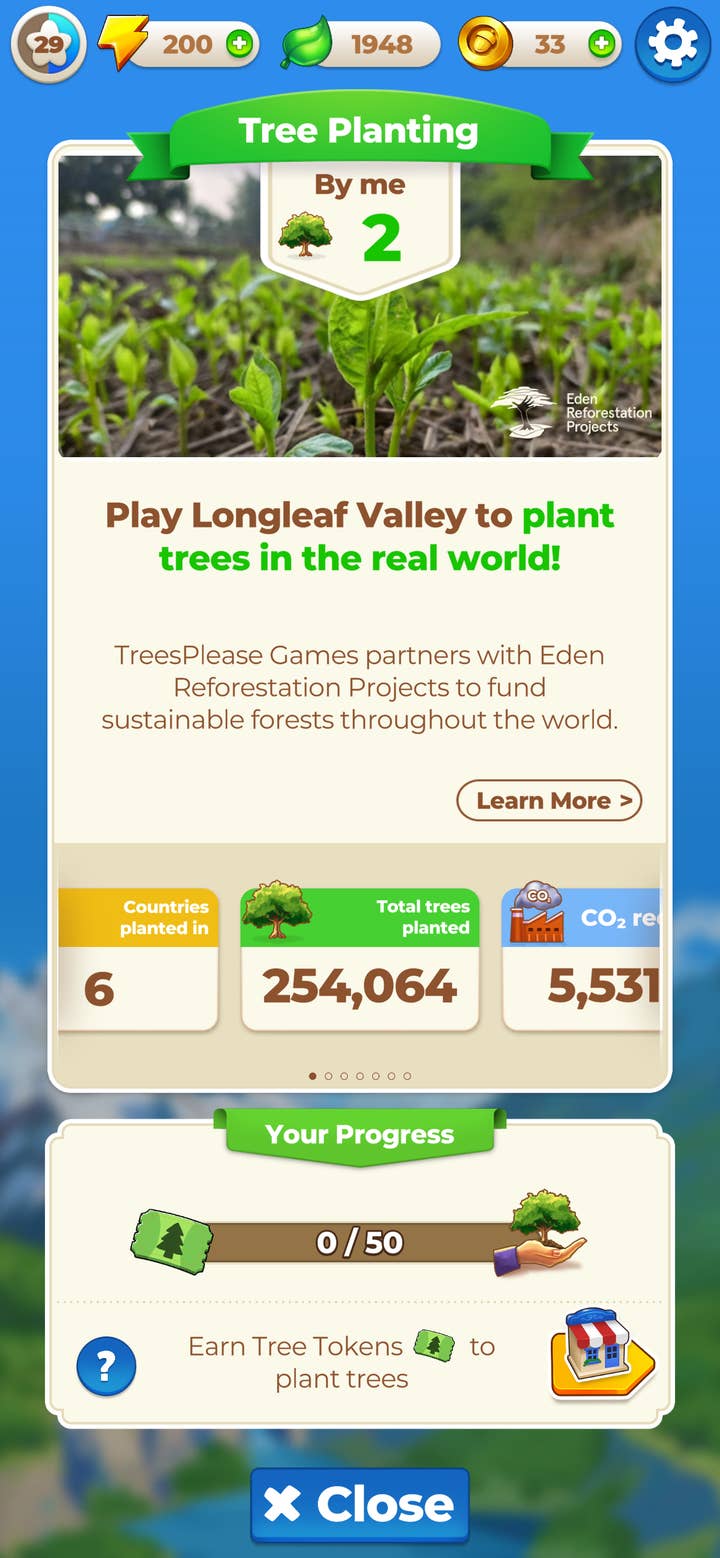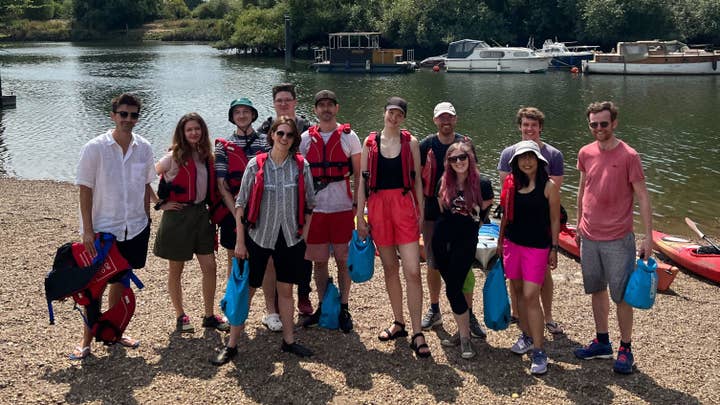TreesPlease on tackling climate change and breaking the industry's "habit of limited-time activism"
New UK developer has raised $8 million in seed funding and is on course to plant one million trees
Sign up for the GI Daily here to get the biggest news straight to your inbox
A new development studio dedicated to encouraging more action from players regarding climate change has emerged from stealth today.
TreesPlease was actually founded in 2019, but has been officially unveiled today alongside its debut game Longleaf Valley and a seed investment round of $8 million.
The studio was co-founded by CEO Laura Carter, who previously worked as general manager on CSR2 at NaturalMotion and has been passionate about environmental concerns from a young age.

"The idea for TreesPlease was in my head for a long time, even before the studio was established in 2019," she tells GamesIndustry.biz. "When I was around three years old, I became that kid, knocking on my neighbours' doors selling raffle tickets and raising money for charities like Greenpeace and World Animal Protection. The motivation to make a positive impact grew with me, and into my teens and twenties I got involved in more hands-on volunteering and activism alongside building a career in my other big passion: games."
TreesPlease's goals are perhaps best demonstrated by Longleaf Valley, a free-to-play casual merge game about a scientist who creates a serum to restore plants in landscapes ruined by mankind.
As players complete in-game tasks, they earn 'tree tokens' (an in-game currency, nothing to do with the blockchain) and once they have enough, they can use them to make a donation to the Eden Reforestation Project, which will plant a tree in the real world. Tree tokens can be earned for free, although players are able to purchase items in the game that help them collect tokens faster.
Soft-launched in selected markets last year, Longleaf Valley has already led to more than 350,000 trees planted, with TreesPlease announcing it's on track to reach one million trees by the end of 2023.
Carter says things "have been going eerily to plan" so far; Longleaf Valley is already profitable, and its success and ambitions have helped attract significant investment. This was initially led by Lakestar at the pre-seed round, but a further funding round was led by March Gaming. TreesPlease has raised $8 million in its seed round, with a number of angel investors on board, including Unity co-founder David Helgason, Activison's Chris Lee, Hutch's Shaun Rutland, and Fusebox's Will Stephens. The investment will be used to further grow the game, and the studio itself.
At the moment, TreesPlease is made up of 15 people, with plans to reach 20 by the end of the year. The team's combined experience includes former talent from King, NaturalMotion, Zynga, Ubisoft, Square Enix, and Ustwo Games. For Carter, it was important to gather developers experienced in free-to-play and casual games, as this is the best way to reach a mass audience and increase the chances of having an impact when it comes to climate change awareness.
"Our goal is for players to feel proud of the trees they've planted and what they've achieved as they play – no guilt, no buyer's remorse, just pride and purpose"
She was also keen to hire senior talent to help lead the studio, as well as attract and mentor new recruits. She adds: "We also needed those same people to be flexible and capable of rolling up their sleeves and getting hands-on, whether that be coding, creating assets, doing the work itself. There just isn't space for pure managers at an early-stage company when you have to spend every dollar so carefully."
But the CEO observes that "experience only takes you so far when you're trying to make an impact."
"You can have the best team in the business but without a shared vision a project has the chance to quickly lose momentum. We won't be a company that churns out one title after another, chasing after the latest trend. It's important to me that our games are always crafted with the central purpose of making a positive impact on the world whilst being loved by millions of players.

"I've been careful to bring together a team that aligns with our mission and values, so that everyone at TreesPlease is motivated to make great games that are good for the planet."
All of TreesPlease's projects will be built around three core pillars: awareness, real-world change, and what Carter describes as "purposeful play."
Awareness is a key one, as it's crucial to not only getting players to think about climate change and other environmental issues, but also to consider how they might help. Carter stresses that it's important to encourage everyone to make a change, since the corporations and governments whose decisions have the most devastating impact won't alter their choices or how they operate "until there is consumer demand or behaviour shift."
"It's very hard to measure our impact here as this is a shift that happens slowly over time, but we know this is a critical aspect of our strategy that makes long-lasting and powerful levels of change," she explains.
"With Longleaf Valley, we have a compelling story that highlights both the causes and impact of climate change, showing how nature and wildlife are hurting as a result of both corporate and consumer behaviours, but does so in a casual and light-hearted way that doesn't feel preachy – it's a difficult but important balance to strike."
TreesPlease's goal of having a real-world impact is demonstrated through efforts like encouraging players to donate their tree tokens, and the studio is exploring other ways to make a difference through its games. For the final pillar, Carter explains that 'purposeful play' is all about making a difference to players.
"We're all familiar with that unwelcome feeling of guilt that comes with playing games, that voice in our heads telling us to do something more productive with our time – and this is coming from someone whose career is to make games," she says.
"Our goal is for players to come away from playing Longleaf Valley feeling proud of the trees they've planted and what they've achieved during their play time – no guilt, no buyer's remorse, just pride and purpose. My feeling is that most people want to make a positive difference in the world, they just don't know how to go about it, so we are bringing them the opportunity to give back directly in an easy and accessible way."
"The games industry has a habit of limited time activism, which deflates the impact of its messages"
She continues: "We want to help players make environmentally conscious choices outside the game, such as the companies they support, how they vote, using clean and renewable energy rather than fossil fuels and moving away from animal agriculture towards a more plant based food diet."
TreesPlease is not the first studio to dedicate itself to 'games for good.' There have been a number of developers and industry events that aim to show how video games and their players can have a positive impact on our world, but not all have been as successful as they hoped to be. Carter says one issue can be when a team has started with the message they want to spread and build the game around that, noting this can sometimes leave players "with an experience that isn't sufficiently fun or doesn't engage them."
"No one wants to be bored while having values thrown at them," she says. "It's unreasonable to expect that anyone would want to spend their precious free time with that. Engagement and retention are key. It's important to give our players best-in-class gameplay, an engaging and fun story, and a compelling reason to return day after day, as well as the opportunity to naturally engage with the for-good aspects of the game.
"That is the problem we're solving. Players should be coming back to the game to enjoy themselves, enjoyment that is supported by the opportunity to create a change in the world. But it needs to extend beyond the game itself; the impact we can make with Longleaf Valley alone is only the start. 'Games for good' titles should aspire to create actual change within how players engage with the world so that once they put their phones down, they can take their learnings with them."

Other industry initiatives have also focused on reforestation; for example, the 'Gamescom forest' project run by the trade show's organisers has seen 18,500 square metres of trees planted near Bayreuth, Germany. While such projects address one issue of climate change, Carter is keen to see games firms do more. She points to carbon offsetting, for example, noting that the amount of energy used to develop and play video games worsens climate change and calls for companies to "maintain a higher standard of accountability regarding their carbon footprint and how to reduce and offset."
She also urges the games industry to "avoid token, short-term efforts," adding: "The games industry has a habit of limited time activism, which deflates the impact of its messages. It seems disingenuous to give up on conservation efforts after hitting an arbitrary goal. We need to be ready to make long-term commitments, as it's the only way to be authentic in our approach."
When asked for advice on what other developers can do to make an impact with their games, Carter first points to their teams.
"Surround yourself with people who share your ambition, so you never lose sight of your goal and can maintain energy around your mission," she says.
"And when you make a positive impact, keep it front and centre with your players and team. We regularly update the team on how many trees their efforts have helped to plant, to keep us all motivated and proud of our achievements but we want to do so much more to really celebrate this with players in the game.
"My final thoughts are to not be afraid of doing something different, being too passive in your approach won't stand out from the crowd and also won't make much of a positive impact. Make a game that keeps players coming back day after day so you can take bigger risks and learn what resonates with your players."
Sign up for the GI Daily here to get the biggest news straight to your inbox

